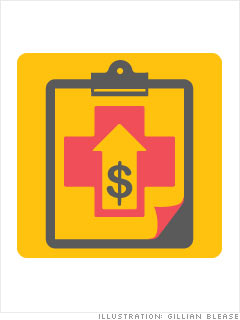Solve your health care challenges
Premiums soaring? Your insurer denied your claim? Retiree benefits got slashed? Try these strategies to cure what ails you when it comes to getting and paying for medical care.

The solution: Take advantage of the myriad ways your employer also gives you to save money on health care. During open enrollment, sign up for a flexible spending account, which typically lets you stash up to $5,000 tax-free to cover out-of-pocket medical bills (that max drops to $2,500 in 2013). Savings: up to $2,000 a year.
Enroll in the mail-order prescription plan -- you might pay $65 for a 90-day supply of a brand-name drug, vs. $200 at the pharmacy. And switch to a preferred or generic drug, if possible, since many companies are raising your costs on non-preferred and brand-name drugs only.
More than half of large firms are also offering incentives that can modestly lower your costs if you make an effort to get healthier. You might earn $100 in cash, say, or get a $20 lower monthly premium if you enroll in weight-loss classes. Not interested, even though you're battling the bulge? Watch out. A growing number of companies are now penalizing employees for unhealthy behaviors, most commonly by imposing a higher premium.
NEXT: Challenge: You need an individual policy

